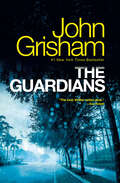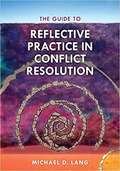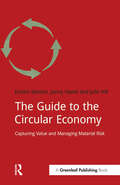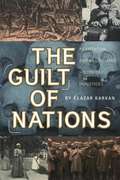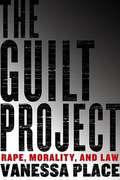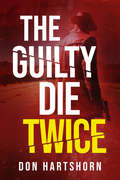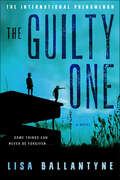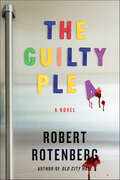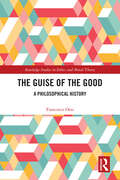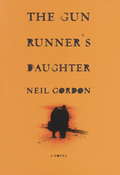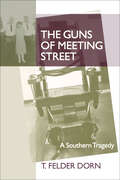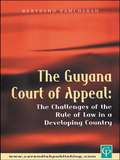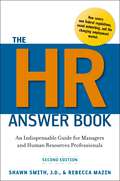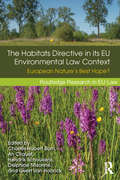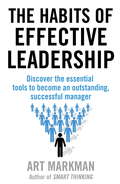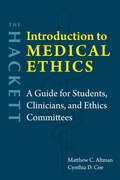- Table View
- List View
The Guardian of the Constitution: Hans Kelsen and Carl Schmitt on the Limits of Constitutional Law
by Lars VinxThis volume provides the first English translation of Hans Kelsen's and Carl Schmitt's influential Weimar-era debate on constitutional guardianship and the legitimacy of constitutional review. It includes Kelsen's seminal piece, 'The Nature and Development of Constitutional Adjudication', as well as key extracts from the 'Guardian of the Constitution' which present Schmitt's argument against constitutional review. Also included are Kelsen's review of Schmitt's 'Guardian of the Constitution', as well as some further material by Kelsen and Schmitt on presidential dictatorship under Article 48 of the Weimar Constitution. These texts show Kelsen and Schmitt responding to one another, in the context of a debate focused on a concrete constitutional crisis, thus allowing the reader to assess the plausibility of Kelsen's and Schmitt's legal and constitutional theories.
The Guardians: A Novel
by John Grisham#1 NEW YORK TIMES BEST SELLER • A classic legal thriller—with a twist. • "A suspenseful thriller mixed with powerful themes such as false incarceration, the death penalty and how the legal system shows prejudice.&” —Associated PressIn the small Florida town of Seabrook, a young lawyer named Keith Russo was shot dead at his desk as he worked late one night. The killer left no clues. There were no witnesses, no one with a motive. But the police soon came to suspect Quincy Miller, a young Black man who was once a client of Russo&’s. Quincy was tried, convicted, and sent to prison for life. For twenty-two years he languished in prison, maintaining his innocence. But no one was listening. He had no lawyer, no advocate on the outside. In desperation, he writes a letter to Guardian Ministries, a small nonprofit run by Cullen Post, a lawyer who is also an Episcopal minister. Guardian accepts only a few innocence cases at a time. Cullen Post travels the country fighting wrongful convictions and taking on clients forgotten by the system. With Quincy Miller, though, he gets far more than he bargained for. Powerful, ruthless people murdered Keith Russo, and they do not want Quincy Miller exonerated. They killed one lawyer twenty-two years ago, and they will kill another without a second thought.Don&’t miss John Grisham&’s new book, THE EXCHANGE: AFTER THE FIRM!
The Guardians: The Sunday Times Bestseller
by John GrishamHe was framed for murder.Now he needs someone on the outside to save him.For 22 years Quincy Miller has sat on Death Row without friends, family or legal representation. He was accused of killing a Keith Russo, a lawyer in a small Florida town. But there were no witnesses and no motive. Just the fact that Quincy was black in an all-white town and that a blood-splattered torch was found in the boot of his car. A torch he swore was planted. A torch that conveniently disappeared from evidence just before his trial.It made no difference. The police photographs of the torch were enough. In the eyes of the law Quincy is guilty and, no matter how often he protests his innocence, his punishment will be death.Finally, after 22 years, an innocence lawyer and minister, Cullen Post, takes on his case. Post has exonerated eight men in the last ten years. He intends Quincy will become number nine.But there were powerful and ruthless people behind Russo's murder. They prefer that an innocent man goes to his death than one of them. They killed one lawyer 22 years ago, and they'll kill another one without a second thought.Praise for John Grisham's latest novel, THE RECKONING:'I couldn't help thinking of Harper Lee's great American novel To Kill a Mockingbird while reading The Reckoning . . . [Grisham] knows how to spin a yarn' - Chicago Sun-Times'May be his greatest work yet' - David Grann, New York Times bestselling author of Killers of the Flower Moon'Beautifully constructed . . . weaves a truly magical spell' - Daily Mail'In this saga of love and war, John Grisham has given us a sprawling and engrossing story about a southern family, a global conflict, and the kinds of secrets that can shape all of us. From the courtrooms and jails of rural Mississippi to the war-torn Pacific, Grisham spins a tale that is at once entertaining and illuminating' - Jon Meacham, New York Times bestselling author of The Soul of America'John Grisham is the master of legal fiction, and his latest starts with a literal bang - and then travels backward through the horrors of war to explore what makes a hero, what makes a villain, and how thin the line between the two might be' - Jodi Picoult, internationally bestselling author of A Spark of Light and Small Great Things'When a master of storytelling and suspense takes on one of the most wrenching stories in history, the result is a book that will break your heart, set your blood pumping and your mind racing, and leave you gasping for breath by the final page. I'm still trying to recover from The Reckoning' - Candice Millard, New York Times bestselling author of The River of Doubt and Destiny of the Republic************THE INNOCENT MAN by John Grisham is now a major six-part documentary series on Netflix************(P) 2019 Penguin Random House LLC
The Guardians: The Sunday Times Bestseller
by John GrishamFRAMED FOR MURDER. FIGHTING FOR JUSTICE.Twenty-two years ago, Quincy Miller was framed for murder - now he wants justice.Accused of killing his divorce lawyer, he's serving life without parole. There were no reliable witnesses and no solid evidence in the case. Enter Cullen Post: he's helped to exonerate eight men and he intends to make Miller the ninth.But powerful and ruthless people were behind this murder - and they're not about to let Miller walk free without a fight...💥350+ million copies, 45 languages, 10 blockbuster films: JOHN GRISHAM IS THE MASTER OF THE LEGAL THRILLER 💥Readers love The Guardians:'A masterful book' ⭐⭐⭐⭐⭐ 'A constant page-turner' ⭐⭐⭐⭐⭐ 'Kept me gripped' ⭐⭐⭐⭐⭐ 'Fantastic read' ⭐⭐⭐⭐⭐ 'Grisham strikes again - an absolute must-read' ⭐⭐⭐⭐⭐
The Guide to Reflective Practice in Conflict Resolution
by Michael D. LangThis book is a commonsense guide to becoming a reflective practitioner, written by a practitioner for practitioners. Relying on actual practice situations, stories, and self-guided exercises, it responds to the questions: Why should professionals care about reflective practice? How do its principles and methods increase competence? What characteristics distinguish reflective practitioners? <P><P> Every person in a conflict resolution process sees the world differently and acts in a distinctive manner. Yet, by following well-developed practice routines, practitioners often fail to consider the unpredictability of human interactions and overlook behaviors that are inconsistent with their expectations. To respond effectively to surprising and unpredictable events, this book encourages practitioners to adapt their thinking, so they can use their knowledge and skills when situations do not match their assumptions or are inconsistent with their practice routines.
The Guide to the Circular Economy: Capturing Value and Managing Material Risk (Doshorts Ser.)
by Julie Hill Dustin Benton Jonny HazellThe term "Circular Economy" is becoming familiar to an increasing number of businesses. It expresses an aspiration to get more value from resources and waste less, especially as resources come under a variety of pressures – price-driven, political and environmental.Delivering the circular economy can bring direct costs savings to businesses, reduce risk and offer reputational advantages, and can therefore be a market differentiator – but working out what counts as "circular" activity for an individual business, as against the entire economy or individual products, is not straightforward.This guide to the circular economy gives examples of what this new business model looks like in practice, and showcases businesses opportunities around circular activity. It also: explores the debate around circular economy metrics and indicators and helps you assess your current level of circularity, set priorities and measure success; equips readers to make the links between their own company’s initiatives and those of others, making those activities count by influencing actors across the supply chain; outlines the conditions that have enabled other companies to change the system in which they operate. Finally, this expert short work sets the circular economy in a political and business context, so you understand where it has come from and where it is going.
The Guilt Of Nations: Restitution And Negotiating Historical Injustices
by Elazar BarkanHow do nations and aggrieved parties, in the wake of heinous crimes and horrible injustices, make amends in a way that acknowledges wrongdoing and redefines future interactions? How does the growing practice of negotiating restitution restore a sense of morality and enhance prospects for world peace? Where has restitution worked and where has it not? The Guilt of Nations explores this increasingly important dynamic in world politics today. Beyond its moral implications, restitution reflects a critical shift in political and economic bargaining. While preserving individual rights, restitution also enables victimized groups to receive growing recognition as groups. Elazar Barkan traces instances of historical crimes, such as the incarceration of Japanese Americans in the United States during World War II, the sexual abuse of "comfort women" by Japanese soldiers, and the recent controversy over the financial dealings between Swiss banks and Nazi Germany. He argues that, as countries including the United States, Australia, and New Zealand come to recognize past injustices toward indigenous peoples within their borders, both governments and minority groups are compelled to redress the history of colonialism and redefine national identity. While restitution is not a panacea, this ever-spreading trend represents a new moral order in world politics.
The Guilt Project: Rape, Morality, and Law
by Vanessa PlaceAn English court in 1736 described rape as an accusation "easily to be made and hard to be proved, and harder to be defended by the party accused, though never so innocent." To prove the crime, the law required a woman to physically resist, to put up a "hue and cry," as evidence of her unwillingness. Beginning in the 1970s, however, feminist and victim-advocacy groups began changing attitudes toward rape so the crime is now seen as violent in itself: the legal definition of rape now includes everything from the sadistic serial rapist to the eighteen-year-old who has consensual sex with a fourteen-year-old. This inclusiveness means there are now more rapists among us. And more of rape's camp followers: the prison-makers, the community watchdogs, law-and-order politicians, and the real-crime/real-time entertainment industry. Vanessa Place examines the ambiguity of rape law by presenting cases where guilt lies, but lies uneasily, and leads into larger ethical questions of what defines guilt, what is justice, and what is considered just punishment. Assuming a society can and must be judged by the way it treats its most despicable members, The Guilt Project looks at the way the American legal system defines, prosecutes, and punishes sex offenders, how this Dateline NBC justice has transformed our conception of who is guilty and how they ought to be treated, and how this has come to undo our deeper humanity.
The Guilty Die Twice: A Legal Thriller
by Don HartshornTwo estranged brothers represent opposing sides of a high-profile double-murder case in this legal thriller debut.Ten years ago, a capital murder case in the heart of Texas split the Lynch family in two. Conscience-stricken Travis left his high-powered law firm to become a public defender, while bullish Jake rose to become District Attorney. Now, estranged lawyer brothers Travis and Jake Lynch find themselves on opposing sides of an Austin courtroom in a high-profile, grisly double murder case—with another accused criminal’s life on the line. Both Lynches are convinced they’re on the right side, but the truth turns out to be more complicated—and deadly.A drug deal double-cross turns lethal, killing two college students and leaving one paralyzed. The victim never saw the gunman but he knows one name: Sam Park. Travis defended Sam’s brother years before. His heart won’t let him turn down the case, even knowing it’ll bring him face-to-face with Jake after ten years of cold silence. Jake, meanwhile, runs afoul of the Austin political machine and needs a case like this to win an upcoming election. And Sam, the prime suspect, won’t talk—not to Travis, and certainly not to the high-and-mighty DA—and time is running out. . . .Can these feuding brothers put aside a decade of enmity in the name of true justice? Or will the truth of what really happened that bloody night go to the grave with Sam Park?Perfect for fans of Due Process by Scott Pratt, The Family Lawyer by James Patterson, Bluebird, Bluebird by Attica Locke, and The Fifth Justice by John Ellsworth.
The Guilty One: A Novel
by Lisa Ballantyne“Sophisticated, suspenseful, unsettling, and highly recommended: a terrific debut from an author to watch.” —Lee Child, #1 New York Times–bestselling authorMoving and suspenseful, Lisa Ballantyne’s The Guilty One is a psychological thriller about the darkness in each of us. It explores how we are all tied to our pasts, and what it means to be guilty.Solicitor Daniel Hunter is called to defend eleven-year-old Sebastian who has been charged with the murder of a young boy on a London playground. While examining Sebastian’s life in order to save it, Daniel can’t help but be transported to his own difficult youth spent in foster care—a time when the one he trusted the most was the one who betrayed him . . . Emotionally wrought, and with an abundance of twists and turns, The Guilty One is a character-driven novel of suspense that explores the true nature of guilt.“A first novel that is both moving and suspenseful; richly detailed, yet with the eerie simplicity of a parable.” —Joyce Carol Oates, #1 New York Times–bestselling author“A page-turner.” —Cosmopolitan (UK)“A child-on-child murder drives Ballantyne’s searing debut . . . [A] scalding exploration of childhood violence, adult refusal to forgive, and redemptive love.” —Publishers Weekly (starred review)“This is a sensitive and insightful narrative that gradually builds suspense during Sebastian’s trial and Hunter’s revelations. Truth is revealed in the final pages, but Ballantyne leaves it to the reader to determine just where the guilt lies. An accomplished first novel and a good bet for book groups.” —Booklist“Absorbing and compelling . . . A captivating debut.” —Kirkus Reviews
The Guilty Plea: A Novel
by Robert RotenbergA “smart and spellbinding” legal thriller “puts you right in the . . . lives of lawyers caught up in a high-stakes murder trial” (Douglas Preston, New York Times–bestselling coauthor of The Monster of Florence and Gideon’s Sword).On the morning his high-profile divorce trial is set to begin, Terrance Wyler, the youngest son of Toronto’s Wyler Food dynasty, is found stabbed to death in the kitchen of his luxurious home. Detective Ari Greene arrives minutes before the press and finds Wyler’s four-year-old son asleep upstairs. Hours later, when Wyler’s wife, Samantha, shows up at her lawyer’s office with a bloody knife wrapped in a towel, the case looks like a straightforward guilty plea.Instead, an open-and-shut case becomes a complex murder trial, full of spite and uncertainty. There’s April Goodling, the Hollywood starlet with whom Terrance had a well-publicized dalliance, and Brandon Legacy, the teenage neighbor who was with Samantha the night of the murder. After a series of devastating cross-examinations, there’s no telling where the jury’s sympathies will lie.As in his debut Old City Hall, Rotenberg’s gift for twists and turns is always astonishing, but his true star remains the courtroom: the tension, disclosures, and machinations that drive this trial straight to its unpredictable verdict.Praise for Robert Rotenberg“A few lawyers are really expert in managing cases—especially criminal cases—in the courtroom. A small percentage of these are very good at making trials come alive. Robert Rotenberg is one of the few, along with Scott Turow, David Baldacci, and John Lescroart. The Guilty Plea is a crackling good read.” —F. Lee Bailey“Robert Rotenberg does for Toronto what Ian Rankin does for Edinburgh.” —Jeffery Deaver, author of Edge
The Guilty Wife: A thrilling psychological suspense with twists and turns that grip you to the very last page
by Elle Croft*** THE TOP 20 EBOOK BESTSELLER ***'A gripping tale of betrayal, deceit, and duplicity. Fabulous.' Jenny Blackhurst, author of How I Lost You 'Relentless and intense...I loved the final twist.' K.L. Slater, author of The Mistake and Blink 'Kept me reading through the night.' Jane Corry, author of My Husband's Wife and Blood Sisters********************** I'm guilty of many things. Bethany Reston is happily married. But she's also having an affair with a famous client.And no one can ever know. But I'm innocent of murder. When Bethany's lover is brutally murdered, she has to hide her grief from everyone. But someone knows her secret. And then one day the threats begin. With an ever-growing pile of evidence pointing to her as the murderer, the only way she can protect her secrets is to prove her innocence. And that means tracking down a killer.An unbelievably gripping game of cat and mouse - with a twist you'll never see coming. Fans of Friend Request by Laura Marshall, Close to Home by Cara Hunter, I Let You Go by Clare Mackintosh and The Wife Between Us by Greer Hendricks will love The Guilty Wife. ********************** Why authors are loving thrilling psychological suspense novel The Guilty Wife 'I couldn't put this down.Pacy and gripping.' Cass Green, bestselling author of The Woman Next Door and In a Cottage, In a Wood'A gripping psychological thriller. I had to keep turning the pages - I just couldn't put it down. And the ending! You just have to read it. ' Patricia Gibney, bestselling author of The Missing Ones, The Stolen Girls and The Lost Child'The Guilty Wife will make you question those closest to you, with an ending that pulls the rug from under your feet. A brilliant debut.' Phoebe Morgan, author of The Doll House'Twisty and fast-moving, The Guilty Wife kept me guessing until the very end! A great read.' Isabel Ashdown, author of Little Sister and Beautiful Liars'I read The Guilty Wife in an intense two day sitting. Brilliant.' Niki Mackay, author of I,Witness.********************** Why readers are loving thrilling psychological suspense novel The Guilty Wife 'Wow! What a book! I couldn't wait to turn the pages and see what else had been thrown into the mix to keep me guessing....which I did until the very end.' Goodreads Reviewer, 5 stars'Fantastic book. Great pace, I was hooked from the first page and almost read in one sitting.' Goodreads Reviewer,5 stars'Totally could not put this down without a real fight. Great writing, great plot and a great read.' Lovereading reviewer'Fast paced, gritty debut novel with a real twist, brilliant storytelling and surprises along the way.' Lovereading reviewer'This is one of the best books I have read for a long time - a story line that is gripping; leaves you wondering if you can trust anyone! As good, if not better than Girl on a Train.' Amazon Reviewer, 5 stars.
The Guilty Wife: A thrilling psychological suspense with twists and turns that grip you to the very last page
by Elle CroftWIFE. MISTRESS. MURDERER. If you were being framed for murder, how far would you go to clear your name?The debut psychological thriller that reads as Apple Tree Yard meets Behind Closed Doors, by way of Double Jeopardy.I'm not guilty of murder.Bethany Reston is happily married. But she's also having an affair with a famous client.And no one can ever know.But that doesn't make me innocent.When Bethany's lover is brutally murdered, she has to hide her grief from everyone. But someone knows her secret. And then one day the threats begin. With an ever-growing pile of evidence pointing to her as the murderer, the only way she can protect her secrets is to prove her innocence. And that means tracking down a killer.An incredibly taut, tense game of cat and mouse - with a twist you'll never see coming.Read by Victoria Fox(p) Orion Publishing Group 2017
The Guilty Wife: A thrilling psychological suspense with twists and turns that grip you to the very last page
by Elle Croft*** THE TOP 10 EBOOK BESTSELLER ***'A gripping tale of betrayal, deceit, and duplicity. Fabulous.' Jenny Blackhurst, author of How I Lost You 'Relentless and intense...I loved the final twist.' K.L. Slater, author of The Mistake and Blink 'Kept me reading through the night.' Jane Corry, author of My Husband's Wife and Blood Sisters********************** I'm guilty of many things. Bethany Reston is happily married. But she's also having an affair with a famous client.And no one can ever know. But I'm innocent of murder. When Bethany's lover is brutally murdered, she has to hide her grief from everyone. But someone knows her secret. And then one day the threats begin. With an ever-growing pile of evidence pointing to her as the murderer, the only way she can protect her secrets is to prove her innocence. And that means tracking down a killer.An unbelievably gripping game of cat and mouse - with a twist you'll never see coming. Fans of Blood for Blood by Victoria Selman, The Friend by Teresa Driscoll, Silent Victim by Caroline Mitchell and Watching You by Lisa Jewell will love The Guilty Wife. ********************** Why authors are loving thrilling psychological suspense novel The Guilty Wife 'I couldn't put this down.Pacy and gripping.' Cass Green, bestselling author of The Woman Next Door and In a Cottage, In a Wood'A gripping psychological thriller. I had to keep turning the pages - I just couldn't put it down. And the ending! You just have to read it. ' Patricia Gibney, bestselling author of The Missing Ones, The Stolen Girls and The Lost Child'The Guilty Wife will make you question those closest to you, with an ending that pulls the rug from under your feet. A brilliant debut.' Phoebe Morgan, author of The Doll House'Twisty and fast-moving, The Guilty Wife kept me guessing until the very end! A great read.' Isabel Ashdown, author of Little Sister and Beautiful Liars'I read The Guilty Wife in an intense two day sitting. Brilliant.' Niki Mackay, author of I,Witness.********************** Why readers are loving thrilling psychological suspense novel The Guilty Wife 'Wow! What a book! I couldn't wait to turn the pages and see what else had been thrown into the mix to keep me guessing....which I did until the very end.' Goodreads Reviewer, 5 stars'Fantastic book. Great pace, I was hooked from the first page and almost read in one sitting.' Goodreads Reviewer,5 stars'Totally could not put this down without a real fight. Great writing, great plot and a great read.' Lovereading reviewer'Fast paced, gritty debut novel with a real twist, brilliant storytelling and surprises along the way.' Lovereading reviewer'This is one of the best books I have read for a long time - a story line that is gripping; leaves you wondering if you can trust anyone! As good, if not better than Girl on a Train.' Amazon Reviewer, 5 stars.'Loved the twists and turns, kept me guessing right to the end, a real page turner, try it it's good!' Amazon Reviewer, 5 stars
The Guilty Wife: A thrilling psychological suspense with twists and turns that grip you to the very last page
by Elle Croft*** THE TOP 10 EBOOK BESTSELLER ***'A gripping tale of betrayal, deceit, and duplicity. Fabulous.' Jenny Blackhurst, author of How I Lost You 'Relentless and intense...I loved the final twist.' K.L. Slater, author of The Mistake and Blink 'Kept me reading through the night.' Jane Corry, author of My Husband's Wife and Blood Sisters********************** I'm guilty of many things. Bethany Reston is happily married. But she's also having an affair with a famous client.And no one can ever know. But I'm innocent of murder. When Bethany's lover is brutally murdered, she has to hide her grief from everyone. But someone knows her secret. And then one day the threats begin. With an ever-growing pile of evidence pointing to her as the murderer, the only way she can protect her secrets is to prove her innocence. And that means tracking down a killer.An unbelievably gripping game of cat and mouse - with a twist you'll never see coming. Fans of Blood for Blood by Victoria Selman, The Friend by Teresa Driscoll, Silent Victim by Caroline Mitchell and Watching You by Lisa Jewell will love The Guilty Wife. ********************** Why authors are loving thrilling psychological suspense novel The Guilty Wife 'I couldn't put this down.Pacy and gripping.' Cass Green, bestselling author of The Woman Next Door and In a Cottage, In a Wood'A gripping psychological thriller. I had to keep turning the pages - I just couldn't put it down. And the ending! You just have to read it. ' Patricia Gibney, bestselling author of The Missing Ones, The Stolen Girls and The Lost Child'The Guilty Wife will make you question those closest to you, with an ending that pulls the rug from under your feet. A brilliant debut.' Phoebe Morgan, author of The Doll House'Twisty and fast-moving, The Guilty Wife kept me guessing until the very end! A great read.' Isabel Ashdown, author of Little Sister and Beautiful Liars'I read The Guilty Wife in an intense two day sitting. Brilliant.' Niki Mackay, author of I,Witness.********************** Why readers are loving thrilling psychological suspense novel The Guilty Wife 'Wow! What a book! I couldn't wait to turn the pages and see what else had been thrown into the mix to keep me guessing....which I did until the very end.' Goodreads Reviewer, 5 stars'Fantastic book. Great pace, I was hooked from the first page and almost read in one sitting.' Goodreads Reviewer,5 stars'Totally could not put this down without a real fight. Great writing, great plot and a great read.' Lovereading reviewer'Fast paced, gritty debut novel with a real twist, brilliant storytelling and surprises along the way.' Lovereading reviewer'This is one of the best books I have read for a long time - a story line that is gripping; leaves you wondering if you can trust anyone! As good, if not better than Girl on a Train.' Amazon Reviewer, 5 stars.'Loved the twists and turns, kept me guessing right to the end, a real page turner, try it it's good!' Amazon Reviewer, 5 stars
The Guise of the Good: A Philosophical History (Routledge Studies in Ethics and Moral Theory)
by Francesco OrsiThis is the first book to trace the doctrine of the guise of the good throughout the history of Western philosophy. It offers a chronological narrative exploring how the doctrine was formulated, the arguments for and against it, and the broader role it played in the thought of different philosophers. In recent years there has been a rich debate about whether value judgment or value perception must form an essential part of mental states such as emotions and desires, and whether intentional actions must always be done for reasons that seem good to the agent. This has sparked new theoretical interest in the classical doctrine of the guise of the good: whenever we desire (to do) something, we see it under the guise of the good; that is, we conceive of what we desire as good, desirable, or justified by reasons, in some way or another. This book offers a systematic historical treatment of the guise of the good. The chapters span from Ancient and Medieval philosophy (Socrates, Plato, Aristotle, Augustine, and Aquinas), through the early modern period (Hobbes, Spinoza, Locke, Hume, and Kant) and up to Elizabeth Anscombe's rediscovery in the 20th century after a period of relative neglect. Together they demonstrate how history can offer potential new models of the guise of the good—or new arguments against it—as well as to give a sense of how the guise of the good can bear on other philosophical issues. The Guise of the Good: A Philosophical History is an excellent resource for scholars and students working on the history of ethics, philosophy of action, and practical reason.
The Guise of the Good: A Philosophical History (Routledge Studies in Ethics and Moral Theory)
by Francesco OrsiThis is the first book to trace the doctrine of the guise of the good throughout the history of Western philosophy. It offers a chronological narrative exploring how the doctrine was formulated, the arguments for and against it, and the broader role it played in the thought of different philosophers. In recent years there has been a rich debate about whether value judgment or value perception must form an essential part of mental states such as emotions and desires, and whether intentional actions must always be done for reasons that seem good to the agent. This has sparked new theoretical interest in the classical doctrine of the guise of the good: whenever we desire (to do) something, we see it under the guise of the good; that is, we conceive of what we desire as good, desirable, or justified by reasons, in some way or another. This book offers a systematic historical treatment of the guise of the good. The chapters span from Ancient and Medieval philosophy (Socrates, Plato, Aristotle, Augustine, and Aquinas), through the early modern period (Hobbes, Spinoza, Locke, Hume, and Kant) and up to Elizabeth Anscombe's rediscovery in the 20th century after a period of relative neglect. Together they demonstrate how history can offer potential new models of the guise of the good—or new arguments against it—as well as to give a sense of how the guise of the good can bear on other philosophical issues.The Guise of the Good: A Philosophical History is an excellent resource for scholars and students working on the history of ethics, philosophy of action, and practical reason.
The Gujarat Carnage
by Asghar Ali EngineerIn February 2002, 59 Hindu pilgrims were burnt alive in a rail coach at Godhra. The National Human Rights Commission investigated the episode. This is a compilation of reports, surveys, and other significant material on the carnage.
The Gun Runner's Daughter
by Neil GordonIn 1995, Neil Gordon's Sacrifice of Isaac was one of the most acclaimed novels of the year. Newsday said it "immediately vaults Gordon into the company of John le Carré and Graham Greene." The Washington Post called it "one of those rare works of fiction that are both edifying and almost sinfully pleasurable." The San Francisco Chronicle described it as "the best kind of page-turner." Now Neil Gordon returns with The Gun Runner's Daughter, an equally compelling tale of moral and psychological suspense, the story of two lawyers who fall in love while they are on opposite sides of an arms-dealing scandal. For twenty-seven years, Allison Rosenthal has lived the life of the liberal elite, from summers in Martha's Vineyard to her studies at Yale. But when her father is indicted on federal charges and his profession--arms dealing--is exposed to public scrutiny, her placid life changes radically. And when her secret childhood lover is named as her father's prosecuting attorney, she must decide where her loyalties lie in a trial that is rocking the presidential administration. Does family come before politics? Love before law? Truth before loyalty? These are the questions the gun runner's daughter must face as she tries to negotiate the dangerous and murky world of her father's profession and the ambiguous morality of power politics in America and Israel. In this audaciously entertaining intellectual thriller, Neil Gordon brings the personal and political together with the mastery of a great storyteller.
The Guns of Meeting Street: A Southern Tragedy
by T. Felder DornAn engrossing investigation into the true crime story of a sixteen-year family feud that ended in murder in early twentieth-century South Carolina.As compelling as fiction, The Guns of Meeting Street reconstructs a series of murders from the early 1940s that rocked rural Edgefield County, South Carolina. Featuring a cast of unlikely antagonists—a prominent store owner, an elementary school teacher, and a law enforcement officer—the acts of revenge resulted in five murders and a trio of executions, including that of the first woman to be electrocuted in South Carolina.Through interviews with members of the two families involved, T. Felder Dorn probes the longstanding feud between the Logues and the Timmermans to uncover this chilling plot of resentment, revenge, and violence. Dorn’s careful research weaves together the oral history of family members affected by the shooting with court transcripts, prisoner confessions, and coroners’ reports to produce a truly gripping account of the events.Although most of the deaths took place between 1940 and 1943, the roots of this tragedy can be traced back to killings that occurred in the Meeting Street community in the 1920s. The story climaxes on January 15, 1943, with the execution, within a single hour, of Sue Stidham Logue, George Logue, and Clarence Bagwell for the murder of Davis Timmerman. Dorn’s saga concludes with the 1960 parole and rehabilitation of Joe Frank Logue Jr., the only one of Timmerman’s killers to escape capital punishment.Not for the faint of heart, The Guns of Meeting Street details the circumstances and motivations for the killings, the complexities of the court cases, and the involvement in the proceedings of South Carolina governors Richard Manning Jefferies, Olin D. Johnston, and J. Strom Thurmond.“If you have any interest in history or true crime, The Guns of Meeting Street is a winner.” —Spartanburg Herald Journal“Dorn’s rigorously researched book unfolds in a clear, straightforward style that renders the events all the more disturbing.” —The State“Dorn’s extremely impressive book has all the elements—is fascinating in its entirety. And for every reader who loves a good mystery, The Guns of Meeting Street is available to intrigue, inform, incite and excite. It’ll never get a chance to gather dust on any bookshelf.” —Union (N.J.) Leader
The Guyana Court of Appeal
by Bertrand RamcharanFirst published in 2001. Routledge is an imprint of Taylor & Francis, an informa company.
The HR Answer Book: An Indispensable Guide for Managers and Human Resources Professionals (Pfeiffer Essential Resources For Training And Hr Professiona Ser.)
by Scotty Smith Rebecca MazinThe HR Answer Book is an easy-to-use problem solver for managers and human resources professionals struggling to adapt to new workplace challenges.Corporate executive Shawn Smith and author Rebecca Mazin address more than 200 of the most common employer questions relating to job functions such as recruitment and hiring, discipline, downsizing, compensation and benefits, training, and employee relations.As a result, the book equips you with the industry's best practices to overcome any hurdle and experience preventing success in your role. This updated second edition contains a comprehensive and up-to-date overview of the human resources field for management instructors, including revised and expanded sections on FMLA, health insurance changes, compensation laws, salary reductions, and using social networking to recruit employees.In The HR Answer Book, Smith and Mazin also share bonus checklists covering:10 Questions to Ask Before Scheduling an Interview,Job Applicant Flow logs,Performance Goals forms,and an Exit Interview Questionnaire.In the fast-paced environment of the twenty-first century, human resources professionals and department managers must try on new approaches to success.Whether used as a cover-to-cover resource or a quick reference for tackling specific challenges, The HR Answer Book offers the immediately accessible tools you need to thrive and help others--and your organization--do the same.
The Habitats Directive in its EU Environmental Law Context: European Nature’s Best Hope? (Routledge Research in EU Law)
by An Cliquet Charles-Hubert Born Hendrik Schoukens Delphine Misonne Geert Van HoorickThis book analyses the Habitats Directive; one of the most prominent piece of EU environmental legislation of the past decades. Seen by some as the cornerstone of Europe’s nature conservation policy, among other measures the Directive established the so-called "Natura 2000" ecological network, which covers more than 18% of the surface of the EU. However, despite the fact the Directive was adopted over twenty years ago only 17% of the protected habitats and species in Europe are being adequately protected while 10-60 % of animal species remain under threat. In light of the limited success and the contested nature of the Habitats Directive so far this book examines the successes and failures of the Habitats Directive from a legal and political angle. The book brings together international experts to consider the application, implementation and future of the Habitats Directive in order to assess whether the Habitats Directive is resilient enough to tackle biodiversity loss in the twenty- first century. Particular emphasis is put on the legal regime attached to the Natura 2000 network and its possible impact on land development and the relationship between the Habitats Directive and other topics including liability for ecological damage and transboundary nature conservation.
The Habits of Effective Leadership: Discover the essential tools to become an outstanding, successful manager
by Art MarkmanIn the internationally acclaimed Smart Thinking, leading cognitive scientist Art Markman presented a three-part formula to help you acquire the skills to innovate, think big and outperform your rivals. Now, he's back with more tools and tips to help you get ahead in the workplace. The Habits of Effective Leadership explores the impact of personality and habits on your potential to be a great leader. Great leaders have just the right mix of what Art Markman terms the 'Big 5' characteristics: extroversion, agreeableness, conscientiousness, openness and emotional stability, as well as certain key habits. Using the unique personality profiler provided, you can determine your own strengths and weaknesses and then apply this knowledge to develop your own smart habits using the tips and tools in the book. The potential for greatness is in everyone. The Habits of Effective Leadership will show you how to develop and use your own innate gifts.
The Hackett Introduction to Medical Ethics: A Guide for Students, Clinicians, and Ethics Committees
by Matthew Altman Cynthia CoeThe Hackett Introduction to Medical Ethics addresses key debates and analyzes prominent ethical perspectives on clinical medicine, healthcare policy, and human experimentation. Using numerous examples and case studies, Altman and Coe apply value theory to contemporary medical practice and trace the repercussions for such philosophical issues as autonomy, death, and justice. The book invites a range of readers to investigate urgent moral questions at the intersection of the body and social institutions.Free online resources to support The Hackett Introduction to Medical Ethics will be available on the book title page at www.hackettpublishing.com in early fall 2025. Resources will include PowerPoint lecture slides, a sample syllabus, links to case studies (to help facilitate small group discussion and apply theoretical concepts), and more.

